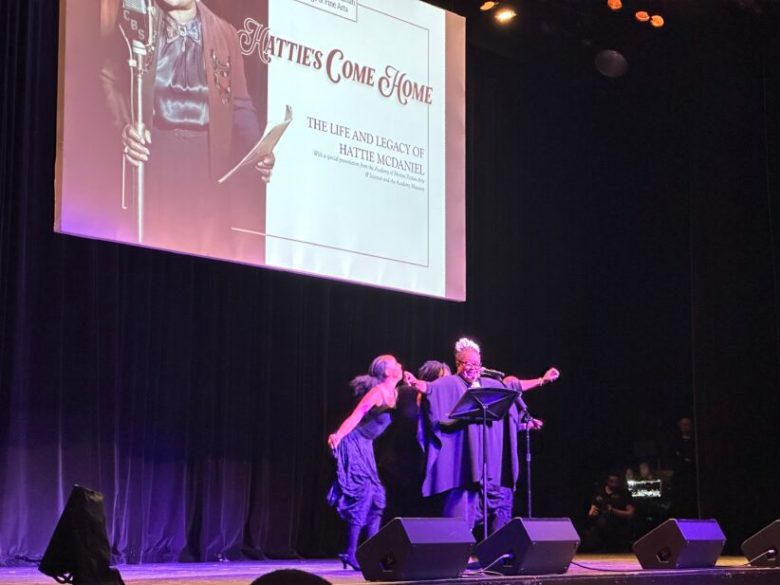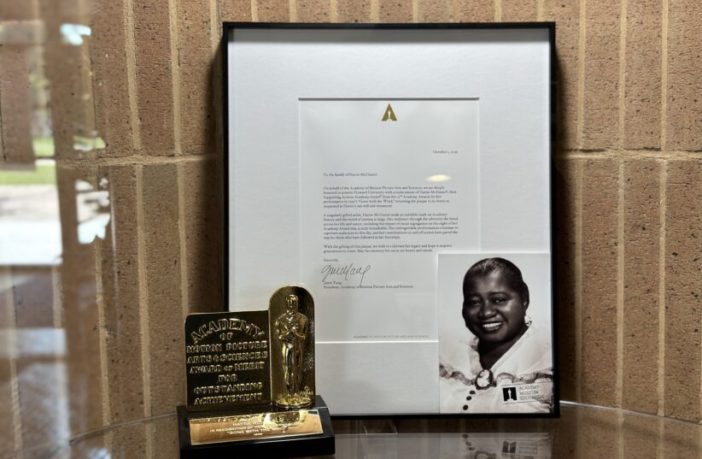By Ebenezer Nkunda,
Howard University News Service
Hattie McDaniel’s Academy Award has returned to its forever home at Howard University. McDaniel became the first Black actor to win an Academy Award in 1940 for her memorable role as “Mammy” in the 1939 film “Gone With the Wind.” In her last will and testament, McDaniel expressed her wish for her award to be housed at Howard University, a wish that was fulfilled until it mysteriously disappeared several years later.
Nearly six decades following its disappearance, the Academy of Motion Picture Arts and Science and the Academy Museum of Motion Pictures presented a replacement to the Chadwick A. Boseman College of Fine Arts on Oct. 1 during a ceremony titled “Hattie’s Come Home,” thereby honoring the late actor’s wishes.
Phylicia Rashad, currently serving her last year as dean of fine arts, kicked off the evening by reflecting on her time as a student at Howard University. Rashad shared that seeing the award daily served as a “source of affirmation” for students, highlighting that McDaniel’s presence was deeply felt within the fine arts community.
The ceremony, which also was live-streamed, included clips of McDaniel’s film performances as well as her acceptance speech at the 1940 Academy Awards. Additionally, professor Kishna Davis Fowler, who has earned critical acclaim, delivered a medley of songs, accompanied by dancers from the Department of Theater.
Dean Phylicia Rashad accepts Hattie McDaniel’s Academy Award on behalf of Howard University in the presence of President Ben Vinson III. (Photo by Ebenezer Nkunda/HUNewsService.com)
In special attendance were members of Sigma Gamma Rho sorority. McDaniel was a charter member when the Los Angeles chapter was founded in July 1939, months after she won her Academy award.
Member Dell Chitty shared that she was excited to witness this momentous occasion and that this recognition of the actress was a long time coming.
The program also featured a special performance by Howard students, who presented an excerpt from “Boulevard of Bold Dreams,” a play by Ladarrion Williams set on McDaniel’s 1940 Oscar night.
A panel discussion moderated by Jacqueline Stewart, the director and president of the Academy Museum, gave perspective on McDaniel’s legacy. Kevin John Groff, McDaniel’s great-grandnephew, emphasized her strong work ethic. He also recited a poem titled “Black Not Accepted,” which was inspired by his great-grand aunt and addresses issues of discrimination.
Groff spoke of his ancestor’s “don’t give up” mentality. Born in Wichita, Kansas, to formerly enslaved parents, McDaniel witnessed their hard work and perseverance, which she adopted.
 Professor Kishna Davis Fowler, who has earned critical acclaim, delivered a medley of songs, accompanied by dancers from the Department of Theater. (Photo by Ebenezer Nkunda/ HUNewsService.com)
Professor Kishna Davis Fowler, who has earned critical acclaim, delivered a medley of songs, accompanied by dancers from the Department of Theater. (Photo by Ebenezer Nkunda/ HUNewsService.com)
Rhea Combs, the director of curatorial affairs at the Smithsonian’s National Portrait Gallery, discussed the Academy Museum exhibition she helped curate. She marked the importance of exploring the legacy that McDaniel left in the industry and described McDaniel’s agency and determination as “undeniable.”
Eleanor Traylor, a graduate professor of English at Howard, acknowledged that McDaniel faced criticism for her roles, many of which cast her as maids. Traylor shared a quote from McDaniel that she discovered during her research: “I portray the type of Negro woman who has worked honestly and proudly.”
Greg Carr, chair of the Department of Afro-American Studies, added the little-known fact that the Rev. Martin Luther King Jr. attended the premiere of one of McDaniel’s films in Atlanta with his father.
It was noted that McDaniel appeared in over 300 films, (many of which were uncredited). Khalid Long, an author, dramaturg and professor of theater arts at Howard, spoke of McDaniel’s contributions to social justice as a plus-sized Black woman. He characterized McDaniel as someone who entered the lion’s den and planted seeds for those who hoped to follow in her footsteps.
The ceremony concluded with Teni Melidonian, the executive vice president of Oscars strategy, presenting the replacement plaque to Howard University. She conveyed, on behalf of Academy President Janet Yang, that Hattie McDaniel left an “indelible mark on Academy history and cinema at large.”
Hattie McDaniel’s Academy Award now resides in the Childers lobby of the Chadwick A. Boseman College of Fine Arts, where it will remain permanently. Safely guarded, of course.
Ebenezer Nkunda covers arts and entertainment for HUNewsService.com.
This article was originally published by Howard University News Service.



